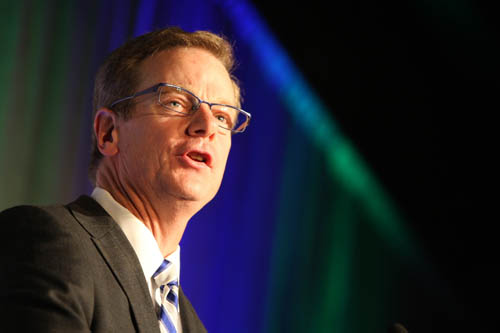
Interview with William Moyers, author of Now What? An Insider's Guide to Addiction and Recovery.
William C. Moyers, the eldest son of television journalist Bill Moyers and his wife, Judith, is known for his 2006 bestseller, Broken, which describes his near-fatal addiction to alcohol and other drugs. In his new book, Now What?, Moyers uses his recovery experiences to help addicts and their loved ones recognize when help is needed, find and navigate treatment programs and establish support systems to maintain sobriety and abstinence. Moyers is executive director of Hazelden's Center for Public Advocacy.

Rosenberg: Your new book about alcoholism and addiction, Now What, is very different from your popular memoir Broken, published in 2006.
Moyers: This book is not profound or deep like a memoir. It is meant to be practical and get people from the problem to the solution. The book tries to break down the walls of denial that stand between the addict, the addict's family and the community. The solution is really very simple and I stress the Twelve Steps of Alcoholics Anonymous because this is how I stopped drinking and drugging, and how many millions of people like me recover.
Rosenberg: Certainly denial is the signature of addicts and often their families. But you give examples of society's denial too like a case in which a woman drove drunk on the wrong side of the highway near New York City and killed her daughter, three nieces and three men in the other vehicle. Despite national attention over the accident, you write that the question of whether she was an alcoholic and addict and needed treatment did not come up.
Moyers: Yes, there is tremendous public indifference, intolerance and misunderstanding about addiction and how alcoholism is manifested. Addiction is a chronic disease like diabetes.
Rosenberg: Yet you write that people don't usually blame someone for a chronic disease like diabetes.
Moyers: That is right. People with chronic diseases sometimes say of addicts, "I didn't choose this condition," but no one chooses to be an addict. The other way addiction behaves like other chronic diseases is -- the person has to accept the condition before he or she can begin to improve or recover. The addict has to become part of the solution and admit powerlessness over the disease.
Rosenberg: Your family's attempts to help you are a subtext of Broken, and in Now What you describe actually hiding in a closet when your family showed up to "rescue" you at a crack house. What advice do you now give families from what you have learned about this disease?
Moyers: The family needs to set clear boundaries, avoid issuing threats and make abstinence from drugs and alcohol a condition of shelter and any other help. They can't let the addict run all over them. Lines of communication also need to be kept open because the family is often the key for the addict to get the help he or she deserves.
Rosenberg: You also say that the family can play a role in a "facilitated bottom." Can you explain what that means?
Moyers: Almost always, the addict will only accept help when he or she hits "bottom." The ultimate bottoms are prison and death, of course, so anything short of that is a way out. For example, an addict may have to go through several treatments to emerge from denial. It takes what it takes. No one can make an addict willing but the addict his or herself.
Rosenberg: Does being the son of a famous person change the way that you carry the message?
Moyers: Because of my visibility I get hundreds and hundreds of requests for information and help. I serve as a something of a lighting rod and am able to reach a lot more people. Still the message I carry is the same simple message any addict carries.
Rosenberg: You wrote in a recent column that online meetings and social media will become more popular as younger people populate recovery groups. What other changes are you seeing?
Moyers: I think Twelve Step programs will continue to find relevance as healthcare dynamics change, because an abstinence based approach that emphasizes the whole person -- mind, body and spirit -- has appeal and works. Especially since access to outpatient care is increasing even as residential treatment options decrease; people will need to embrace recovery outside of a treatment setting. And since addiction is a disease of isolation, recovery meetings are our antidote.
Rosenberg: How do you personally work your program to prevent relapse? Especially since it is said that the "ism" in alcoholism stands for "incredibly short memory"?
Moyers: I read from the literature like 24 Hours a Day, One Day at a Time and Alanon books every day and attend my regular meetings like my home group on Monday nights. I stay vigilant about medication and have told my doctor and dentist about the risks with any pain pills I would have to take. And, every morning I thank my Higher Power for giving me a new day and every night for helping me get through the day without a drink or drug.
Now What
An Insider's Guide to Addiction and Recovery
Softcover, 208 pp.
William Cope Moyers
I3982
Hazelden
2012
Martha Rosenberg is a health journalist whose first book, Born With a Junk Food Deficiency was recently published by Prometheus Books.